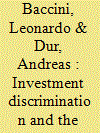| Srl | Item |
| 1 |
ID:
078294


|
|
|
|
|
| Publication |
2007.
|
| Summary/Abstract |
Current research suggests that changes in societal demands or in political institutions propelled the far-reaching reduction of American external trade barriers since the mid-1930s, yet is unable to account for the exact pattern or timing of trade liberalization. I argue instead that exporters lobby more against losses than in favor of gains of foreign market access. Whenever foreign countries inhibit access to their markets by establishing a discriminatory trading arrangement, negatively affected exporters mobilize in defense of their interests. This lobbying then prompts excluded countries' governments to engage in policies aimed at the protection of exporter interests. Applying this argument to U.S. trade policies from the 1930s to the 1960s, I demonstrate that American exporters repeatedly mobilized in response to discrimination in Europe. The resulting peaks in exporter mobilization explain the passage of the important trade bills known as the Reciprocal Trade Agreements Act (1934) and Trade Expansion Act (1962).
|
|
|
|
|
|
|
|
|
|
|
|
|
|
|
|
| 2 |
ID:
121752


|
|
|
|
|
| Publication |
2013.
|
| Summary/Abstract |
Interest groups differ in the strategies they use to influence public policy. Some mainly try to gain access (i.e., have direct contact with decision makers), whereas others tend to 'go public' by launching campaigns that aim to mobilise the broader public. In this article it is argued that group type - namely the distinction between business associations, professional associations and citizen groups - is a major determinant of the choice of strategy. The effect of group type, however, is conditional on the group's endowment with material resources and the issue context: the differences across group types are largest for resource-rich associations and associations active in distributive policy fields. Original data from surveys of national associations in five European countries (Austria, Germany, Ireland, Latvia and Spain) enable the assessment of this argument. The theoretical expectations are supported, with the results having relevance for the normative evaluation of political systems and the positive study of interest group influence.
|
|
|
|
|
|
|
|
|
|
|
|
|
|
|
|
| 3 |
ID:
139407


|
|
|
|
|
| Summary/Abstract |
The proliferation of bilateral and regional trade agreements has arguably been the main change to the international trading system since the end of the Uruguay Round in the mid-1990s. We argue that investment discrimination plays a major role in this development. Preferential trade agreements can lead to investment discrimination because of tariff differentials on intermediary products and as a result of provisions that relax investment rules for the parties to the agreement. Excluded countries are sensitive to the costs that this investment discrimination imposes on domestic firms and react by signing a trade agreement that aims at leveling the playing field. We test our argument using a spatial econometric model and a newly compiled data set that includes 166 countries and covers a period of eighteen years (1990–2007). Our findings strongly support the argument that investment discrimination is a major driver of the proliferation of trade agreements.
|
|
|
|
|
|
|
|
|
|
|
|
|
|
|
|